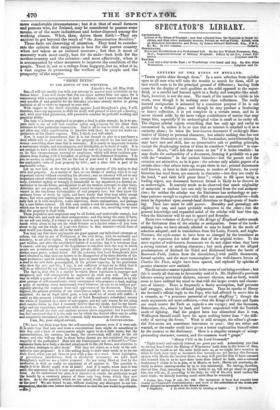DESTITUTION AND EMIGRATION.
A NOTION obtains, that emigration is a resort alternative with prosperous employment for the working classes at home. We observed lately, that it is not at all incompatible with other mea- sures for the relief of the poor, in Ireland especially ; and further consideration has convinced us that it is most easily and advan- tageously conducted at times when the working classes are not sunk in the lowest depths of poverty. It is requisite that the emigrants should be in good health ; which they are less likely to be in a time of extreme poverty. It is desirable that they should possess sonic means ; and it appears probable, indeed, that al- though a state of excessive hardship may drive them out of the country, a better condition also affords its inducements to mi- grate. Though statistics do not furnish sufficient data to settle any question involving so many considerations, the subjoined figures may be studied with interest. These represent the total
emigration from the United Kingdom for the years specified:
Team. Emigrants. Years. Emigrants.,
1832 193,140 1836 75,417 '
1833 62,527 1837 7204- --
1834 76,222 1838 33,222'
1835 44,478 1839 62,207 '
For the subsequent years we are able to give returns which distinguish the emigration from the Three Kingdoms severally.
Years. England. Scotland. Ireland. Total..
1840 56,213 5,811 28,719 90,743 1841 72,104 14,060 32,428 118,592 1842 74,683 13,108 40,553 128,344 1843 36,255 7,931 13,026 57,212 1844 .. ..... . 50,257 4,504 15,925 70,686 1845 65,524 4,272
23,705
93,501
It will be observed in these returns, that although the terrible year 1842 gives the maximum of emigration, the progress of the figures by no means accords with the progress of destitution. Thus there is a striking falling-off in the year 1835 as compared with 1834-the migration Aceived a check at the beginning of the great panic ; and, reviving again in 1836, it continued to decline throughout the subsequent years, though they were bad years. Much attention had been drawn to Colonial subjects; the agents of the Australian Colonies were active ; Canada had her agents ; and the progress of emigration up to 1842 was striking. The year 1843 was nearly as bad in respect of popular " distress",; but in the number of emigrants it is among the lowest on the list. No doubt, the distress which prevailed in the Australian Colonies also had its effect in checking emigration ; and the war- like aspect of affairs in America acted as a check. In the next two years, however, there was no striking renewal of the efforts to promote emigration to Australia, and the warlike aspect conti- nued in the West ; yet, in spite of those obstacles, the emigre.- tion revived-with the reviving prosperity of the country. On the whole these returns would appear to signify, that although excessive and sudden distress may give an impulse to emigration at the beginning of the distress, destitution is not favourable to a regular advance of emigration, but the reverse. Such a fact is not difficult to account for. Even the gratuitous emigration provided by Government, or by a bounty system, does not furnish all the means which an emigrant requires-to buy clothes, to pay up his rent, and to travel to the nearest agency. For such purposes the destitute man has no cash, no credit. Moreover, he has neither hope nor energy • possibly even his health is so much injured, that he doubts whether it is worth his while to offer himself for examination by the surgeon of the
Emigration-office. .
A very remarkable emigration from Ireland is now going on. That of which we speak is not the continued exode of the poorest class, for it is observed that the emigrants of this year are in more comfortable circumstances; but it is that of small farmers end persons who, for Ireland, may be considered to possess some ;swans, or of the more industrious and better-disposed among the working classes. What, then, drives them forth T—They are anxious to get beyond the reach of" the Assassination Societies." These facts are deserving of attention. They tend to corrobo- rate the opinion that emigration is best for the parent country, when not taken as an isolated measure ; but that it must of necessity work most easily, best for its ends—best both for the mother-country and the colonies—and most effectively, when it is accompanied by other measures to improve the condition of the people. Treat it, not as a refuge from beggary, but as, what it is, a vast engine in promoting the welfare of the people and the prosperity of the empire.



























 Previous page
Previous page